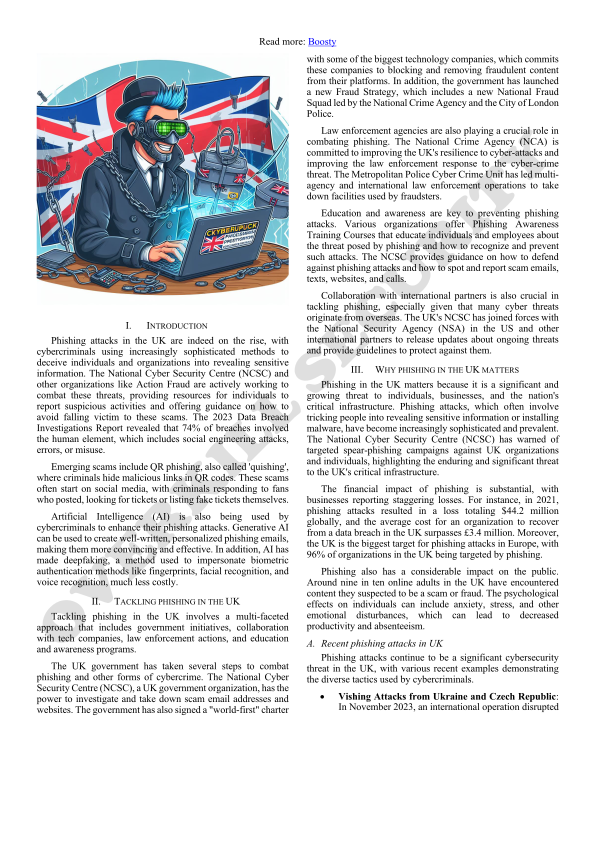Phishing in UK

Phishing attacks are on the rise in the UK, and it seems our cybercriminal friends have been busy updating their deception toolkit. They’re no longer just sending out those fancy «I’m the deposed prince» emails. No, they switched to high technology, plunging into the exciting world of QR phishing (or «quishing», because apparently everything is better with «q») and even connecting artificial intelligence to write these such convincing fraudulent emails.
And for those who thought QR codes were just a harmless way to download a restaurant menu, think again. They’re the new golden ticket for scammers on social media, preying on the unsuspecting masses looking for concert tickets or the next big sale. Meanwhile, AI is making it easier than ever to fake someone’s identity, because who needs real fingerprints or faces anymore?
Let’s start with the classic «vishing» call centers, where enterprising scammers in Ukraine and the Czech Republic put on their best British accents to convince you to send them a bit of pocket change—just tens of millions of euros. Who knew that the voice on the other end of the phone asking for your bank details was actually Boris in Praha, not Barclays in Knightsbridge?
Then there’s the hospitality hustle, where hotel employees are duped by emails that are about as genuine as a three-pound note. Click on this link, and voila! You’ve just given a hacker a five-star stay in your computer system.
And let’s not forget the good old United States Postal Service, or as the scammers would have it, the «United Scams Phishing Service.» They’ve been sending out emails that are so convincing you’d think Mr. Postman himself was asking for your details. Except instead of delivering parcels, they’re parceling out your personal info to the highest bidder.
Over in the world of UK transport, it seems some employees couldn’t spot a phishing attack if it came with a side of chips. An email with a fake portal link was all it took to turn their mailboxes into an all-you-can-eat data buffet.
But wait, there’s more! The latest trend is «quishing, » where QR codes are the new black for cyber swindlers. Because nothing says «trust me» like scanning a mysterious barcode that promises a package delivery but delivers a package of malware instead.
Law firms aren’t immune to the phishing frenzy either. One click is on a dodgy link, and suddenly you’re not just practicing law, you’re practicing how to explain to your clients why their confidential information is now trending on the dark web.
Job seekers, beware the WhatsApp wiles, where scammers are offering you the job of a lifetime—so long as your lifetime dream was to be part of a fraud scheme.
Small business, you are not small enough to be noticed! In fact, you are the star of the show, and a whopping 82% of online threats concern only you. And let’s applaud for the 464% increase in the number of phishing attacks in your industry.
And who is on the front line of the fight against this digital epidemic? The National Cyber Security Center (NCSC) and Action Fraud, armed with their powerful resources, are helping the public report these dastardly acts. Because nothing says «we have everything under control» like a government website and a hotline.
The UK government has rolled out the red carpet for the «world’s first» charter with tech giants, promising to block and remove fraudulent content. Because if there’s one thing that will deter scammers, it’s a clearly worded team agreement with the National Crime Agency (NCA) and the Cybercrime Division.
Education and awareness are touted as «silver bullets» against this growing threat. Various organizations offer phishing awareness courses because watching a PowerPoint presentation is a sure way to defeat sophisticated cybercriminals. And let’s not forget about international cooperation, because phishing, like a severe cold, knows no boundaries.
So, as we wrap up this festive phishing roundup, remember: if it looks like a scam and smells like a scam, it’s probably just another day on the internet. Keep your wits about you, and maybe don’t click on that link from «Her Majesty’s Secret Service» promising you a tax refund in Poundcoin.
Unpacking in more detail


